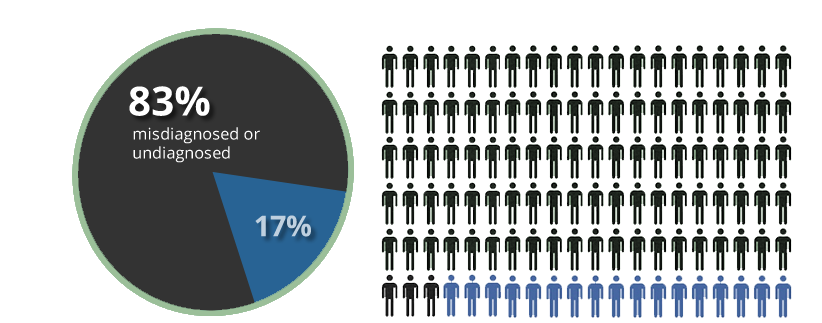Autoimmune Health
An autoimmune diagnosis can be a lonely experience for many people, but there is hope for a healthier way of living. Functional medicine helps you get to the root cause of autoimmunity – addressing why you are sick and the most effective lifestyle changes to restore your health.
Celiac Disease • Rheumatoid Arthritis • Lupus • Multiple Sclerosis (MS) • Hashimoto's • Crohn's Disease • Type 1 diabetes • Myasthenia Gravis • Type 1.5 Diabetes (Autoimmune) • Type 3 Diabetes (Dementia)
The immune system is a critical function to protect you from disease and pathogens. But there are times when the immune system mistakenly starts attacking your body instead of foreign threats. There are more than 80 known autoimmune diseases, and Western medicine views many of these diagnoses as “incurable.” Common types of autoimmune conditions include hasimoto's, inflammatory bowel disease, fibromyalgia, autism, celiac disease, rheumatoid arthritis, lupus, and multiple sclerosis.
The autoimmunity spectrum is a measure of the progression of this disease. In the beginning, silent autoimmunity results in small health concerns, but the immune system hasn’t caused enough damage to warrant a Western medicine diagnosis and treatment plan. Conventional doctors wait until you are sick enough to require medication for symptom management.
Regardless of where you are on the spectrum of autoimmunity, don’t wait until the damage is irreversible. Working with a functional medicine provider gives you immediate solutions to address these issues before the condition progresses. We look at the real cause of the symptoms and get to the root of your health concerns.
As many as
50 million
Americans have an autoimmune disorder 1
0%
of the populationIt is estimated that up to 83% of Americans who have celiac disease are undiagnosed or misdiagnosed with other conditions.

Over a four-year period, people with undiagnosed celiac disease cost an average of $3,964 more than healthy individuals. 2
$3,964

The symptoms of an autoimmune condition vary depending on the diagnosis and often include muscle and joint pain, swollen glands, fatigue, digestive issues, and more. While Western medicine uses drugs and treatments to alleviate these symptoms, functional medicine looks at the whole-body system to find the most effective plan that addresses the root cause.
- https://nationalstemcellfoundation.org/glossary/autoimmune-disease
- https://www.ncbi.nlm.nih.gov/pmc/articles/PMC2906636/
"I'm not afraid of storms, for I'm learning how to sail my ship."
- Louisa May Alcottz

The Stages of Autoimmunity
Stage 1
Silent Autoimmunity
Elevated antibodies with no symptoms or loss of tissue
Stage 2
Autoimmune Reactivity
Elevated antibodies with symptoms and no clinically noticeable loss of tissue
Stage 3
Autoimmune Disease
Elevated antibodies with symptoms and measurable tissue destruction
Our Approach
Autoimmunity is connected with higher levels of inflammation in the body. So, the functional medicine approach is focused on reducing that inflammation and creating more balance overall. These six factors provide the foundation for addressing autoimmunity:
Physical Activity & Exercise:
A habit of exercising regularly helps strengthen the body and alleviate common symptoms associated with autoimmune conditions. For example, exercise can decrease fatigue and increase mobility, leading to a better quality of life for patients.
Diet & Nutrition
Every bite you take either supports your health or causes inflammation. Since autoimmune conditions are connected with high levels of inflammation in the body, it’s essential to stick with anti-inflammatory foods.
Sleep
Poor sleep can result in increased inflammation within the body, causing your autoimmune condition to flare. The challenge is that many autoimmune diseases make it difficult to sleep. Getting the right amount of sleep is critical for healing, which is why we always address sleep hygiene with our patients.
Stress reduction & Mental health
Stress has an undeniable impact on hormone levels. When the body is in “fight or flight” frequently, it can lead to systemic inflammation. Stress is often a factor that worsens the body’s autoimmune response, which is why stress management is a critical step in treating autoimmune conditions.
Harmful substance reduction
The toxic load of harmful substances, such as drugs and alcohol, take a toll on the body. When these substances are consumed, it impairs the function of immune cells and leads to chronic inflammation. This toxic load can cause an autoimmune condition to increase in severity. So, it’s essential to reduce the use of these substances – or avoid them altogether.
Healthy Relationships
As mentioned above, stress can contribute to the development of autoimmune conditions. Relationships can be one common source of stress. Managing healthy relationships is a critical step to improving overall health. Not only do good relationships help with wellness, but they make you healthier and happier.
Other health and lifestyle factors also need to be considered, such as infections, co-infections, environmental toxins, and more.
Through functional medicine, we help you see healthcare in a different light. Our goal is to help you get to the foundational lifestyle issues that are contributing to this illness.
Instead of managing symptoms with medication, it’s time to be proactive in getting to the root cause of this disease.
If you have an autoimmune condition, then we invite you to book an appointment with our team to learn more about functional medicine solutions.
